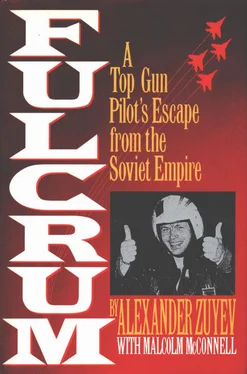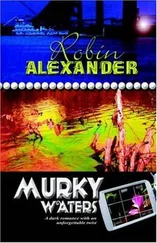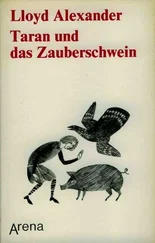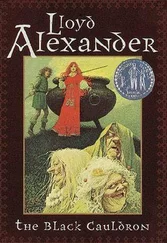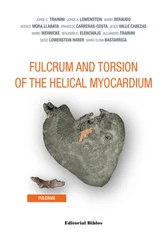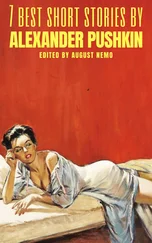I sagged in the ejection harness with the sudden deceleration, still surprised to be on the ground so smoothly. If anyone was watching, he had seen a fine display. That was undoubtedly the best landing I had ever flown.
I let the airplane roll past the small terminal and squat control tower. Passing the buildings, I saw no parked aircraft, not even any vehicles. The modern airport looked deserted. I couldn’t help but notice how smooth this runway was. If I had any doubt I had left the Soviet Union, this beautiful seamless concrete runway reassured me. I parked at the far right-hand edge of the runway to be clear of any incoming traffic, shut down the engines, popped the canopy, and breathed deeply. The air was cool and clean, with a salty hint of the nearby sea.
Only five hundred yards away, huge double-trailer trucks rumbled along the coastal highway. They were lovely trucks, brightly painted, with shiny cabs and strange orange and yellow letters painted on their tall flanks. I had seen such trucks in Western movies. They were an unmistakable sign of wealth, of commerce, of a world I did not know. Then I noticed the billboards on the other side of the highway. They were also printed with large, bright Roman letters. There were pictures of women in shiny kitchens, a smiling man at the wheel of a car. I wished I could read the words. I was confident they were advertisements, not propaganda slogans.
“I made it,” I whispered, then laughed out loud. A warm joy I had never before experienced rose inside me. Then I remembered I was a Soviet Air Force pilot on my last mission. I went to work to set my cockpit straight, happily tripping circuit breakers and shutting down systems. I stared at the left-hand corner of my panel and felt a sudden stab of cold.
The master weapons sensor panel switch was still in the off/safe position. That was why the cannon had not fired.
“Blyat,” I swore, hitting the panel with my left fist.
In my muddled condition on the Tskhakaya runway, I had not noticed that switch because the panel had been half-hidden by the accordion-fold anti-glare curtain, meant to shield the HUD from the instrument lights. For years, my fellow pilots and I had written reports complaining about that damned curtain. But the inertia-bound Soviet bureaucracy had not responded. Now those lazy bureaucrats deserved decorations. They had just inadvertently saved twelve MiG-29s from destruction.
I looked at the clock, 0547. I had been on the ground a full seven minutes, but no one had come for me. Maybe Turkey was in a different time zone and it was only just past five in the morning here. I decided to taxi to the terminal. This time, I remembered to set the throttles properly for engine start.
As I swung back down the runway, my shoulder suddenly throbbed with hot pain. All my reserve of adrenaline was burnt. The pain began to swell. I would need a ladder to get out of this cockpit safely. I taxied slowly and swung across the yellow lines of a vehicle parking zone just beside the modern terminal. I shut down my engines and unstrapped the ejection harness to raise in my seat. The terminal still seemed deserted.
Then I saw three faces peering at me through the wide glass doors of the terminal, an old man and two younger fellows. Their eyes were fixed in wide stares. When I waved, the two younger men scurried away into the shadows. But after a while, the old man opened the door and came ahead cautiously to stand near my left wing.
I smiled. Then waved him toward me, trying to gesture that I needed a ladder. He came closer. I saw the white stubble on his cheeks. I realized he was a watchman. This was my first contact with authority in Turkey. I had planned carefully for this moment. I wanted the news of my arrival to reach the Americans as quickly as possible.
“American,” I shouted, following my careful plan to this final step. I tapped my chest and called once more in the English words I had painfully memorized from my dictionary. “I am American.”
The old man’s eyes had been focused on the huge red stars on my twin rudders. Now he smiled.
EPILOGUE
Ankara, Turkey,
17 June 1989, 0920 hours
The convoy of vehicles pulled smoothly to a stop on this narrow country road. Beside us, the fields of ripe wheat moved in the breeze. The morning was still cool, but the summer sun of Anatolia was climbing in the brassy sky. Three miles to the west, Ankara’s international airport rumbled with jet traffic. The security officers from the Turkish Ministry of Defense, however, had done well in selecting this rendezvous. There were no houses in sight, no cars, or even farm tractors.
I climbed out of the armored van and stood in the sun, waiting. Muscular young guards in gray suits piled from the other vehicles, brandishing Uzi submachine guns. We were waiting for a similar convoy from the American embassy.
I had been in Turkey almost a month. And those four weeks had been eventful. The first hours in Trabzon, the Turks had treated me with great kindness and professional skill. I had been taken from the airport to a hospital, where my wounds were treated. Luckily the bullet from Chomayev’s AKM had caused no permanent damage, entering my upper right biceps, plowing through the muscle to exit from the thick flesh behind my armpit. An X ray revealed the bullet had not touched bone or important ligaments. I was given my own cheerful room and guarded around the clock by soldiers with automatic rifles. That first afternoon a Russian-speaking teacher was brought in to serve as translator. Through him I made my formal request for political asylum and asked that the Turks contact the Americans.
Within hours the chief of staff of the Turkish Air Force arrived with a delegation of officers. These officers told me it was vital that I write the request for asylum in my own hand. But my right hand was still numb, my arm in a sling. So I clumsily printed my formal request, using my left hand. The Turkish Air Force officers were concerned about the safing procedures for my plane’s weapons and ejection seat. It was hard to explain where the seat’s safety pins were because I had hastily dropped them on the cockpit deck. But after a while, the officers seemed satisfied. Before they left, they patted me on the back and we all posed for pictures together. They assured me I would receive asylum.
The next day I heard the rumble of a heavy jet landing at the nearby airport. My translator explained that a Soviet delegation had arrived from Tskhakaya to reclaim the MiG-29. Over the next confused hours, I was able to piece together what had happened. More bad luck. Although I had no way of knowing, the day I hijacked the fighter, a high-level Turkish military delegation, led by their chief of staff, was on an official visit to Moscow, guests of Defense Minister Marshal Yazov. As soon as the news was flashed to the Kremlin, Yazov personally extracted a solemn promise from the Turkish generals that their government would return the fighter.
The Soviet authorities also pressured the Turks for my extradition back to Georgia. Their demand was based on the claim that I was a common criminal, not a defector seeking political asylum. But again, glasnost ironically dominated the situation. In the past the Defense Ministry would have blatantly stated that I had murdered the apron guard, making me an obvious candidate for extradition. But with the new policy of openness, the authorities had been forced to reveal details about the escape that they would have hidden in the past. Corporal Chomayev had, in fact, been interviewed on Soviet television, a broadcast seen in Turkey. He was obviously not dead. And he gave an accurate account of our desperate fight on the parking apron. From this interview it was clear that I had acted in self-defense when I shot him.
Читать дальше
